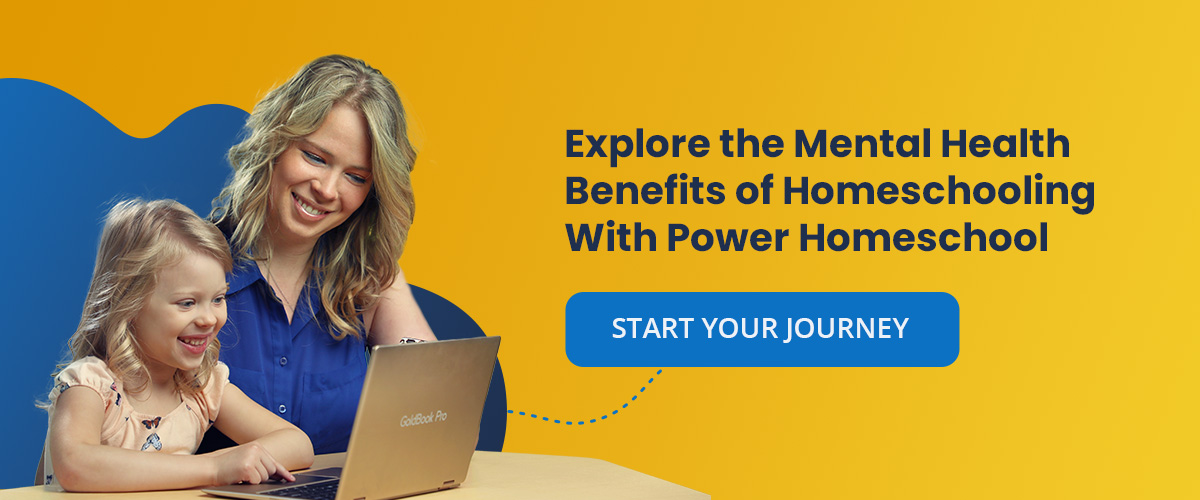Homeschooling has well-known benefits like robust technological platforms, personalized academics and flexible schedules. Plus, homeschooling could be a better choice for your family for numerous other reasons, including its impact on mental wellness.
Understanding how homeschooling affects mental health is crucial for current and potential homeschooling parents. It has significant benefits. Homeschooling boosts confidence, strengthens family bonds and alleviates sources of student anxiety.
An Introduction to Homeschooling and Mental Health
Families worldwide switched to homeschooling in response to the COVID-19 pandemic. Unsurprisingly, many people realized the benefits and decided to continue teaching their children from home even after schools resumed in-person classes. Today, an estimated 3.13 million school-aged children nationwide are homeschoolers. Besides the considerable academic benefits, homeschooled children are often happier, better adjusted and more engaged.
Almost 15% of children received treatment for mental health disorders in 2021 amid an escalating youth mental health crisis. Homeschooling provides a safe, supportive, low-stress learning environment — which is not always easy to come by in today’s fast-paced world. While shifting to homeschooling can be challenging, many children experience reduced long-term stress. Home is a comfortable, quiet space. It fosters a positive mindset and allows students to focus on academics. They can learn without bullying, cliques, peer pressure and other stressors of a traditional setting.
Education is highly personal. Every student and family has different perspectives, needs and challenges. Like all schooling frameworks, homeschooling affects mental health in various ways. With robust support, families find the process beneficial for students mentally, physically and psychologically.
See How Power Homeschool Supports Families
The Psychological Benefits of Homeschooling
Here are some of the considerable mental health advantages of homeschooling.

- Schedule flexibility: Homeschooling your child means you can create a schedule that works for everyone in your family. Flexibility means no stressful rush in the morning because you don’t have to worry about school starting too early. You can take breaks as needed throughout the day. It also promotes a better school-life balance. Students can integrate sports, hobbies and clubs into their daily lives.
- Academic and emotional freedom: In a conventional classroom, children must find a way to keep up with their peers or risk falling behind. They are often anxious about asking questions or verbalizing their challenges in front of their classmates. Homeschooled children can work at their preferred pace without worrying about fitting in. They can repeat lessons or learn in different formats as needed.
- Strong family relationships: Homeschooled children develop strong family bonds. They participate in daily errands, do chores and give back to their communities.
- Self-confidence and independence: Homeschooled children take ownership of their education. They can communicate their passions, challenges and dreams for the future. They also take an active role in the home. Having autonomy boosts their self-confidence. It equips them with skills they can use throughout their lives. They also avoid stressful triggers, like bullying or feelings of inadequacy.
- Improved quality of life: A healthy body often means a healthy mind, and homeschooling can improve sleep in children. They have flexible schedules and can include meaningful physical activity daily.
The Role of Curriculum Selection in Supporting Mental Health
When homeschooling, you can choose a curriculum that fits your values and aligns with your child’s goals. For instance, you can create a lesson plan that supports building coping skills. Teach strategies for managing complex emotions in a safe and non-judgmental space.
You can also decide how to present course material, reducing stress and boosting self-esteem. Start with subjects they already enjoy or understand to let them experience early successes. From there, you can make the coursework progressively challenging.
As your child grows, they get a clearer picture of their lives after high school. Keeping them engaged during this period is easier when you control what and how they learn. Instead of having them zone out in lessons that do not seem relevant or meaningful, you can structure personalized learning to support their career aspirations, boosting motivation and confidence.
Addressing Common Concerns — Is Homeschooling Better for Mental Health?
Numerous myths exist about homeschooling, including the misconception that homeschoolers never socialize or are misfits. The truth is that many families choose homeschooling because it gives their children more opportunities to make like-minded friends, focus on their studies and excel in sports. Whether homeschooling improves mental health depends on the student, family and circumstances.
Several factors could influence a parent to transition to homeschooling to support their student’s mental well-being, such as dealing with health challenges. Students with mental health conditions like anxiety may find homeschooling beneficial. They can progress in line with their needs in a compassionate environment.
Of course, choosing homeschooling affects the whole family. Parents’ mental health is also a consideration. Though homeschooling requires time and effort, many parents are more comfortable when their children are safe at home learning with quality course materials.
Implementing Mental Health Strategies in Your Homeschool Routine
Regardless of how well you map out your education plan, you may encounter roadblocks along the way. Check in with your child’s progress, including their mental and psychological well-being. You may discover you need to adjust the daily schedule to address burnout, anxiety or any other mental health challenges.
- Change your routine: Predictability and healthy habits are essential elements of successful homeschooling. However, everyone needs a change sometimes. Keep your child engaged by shaking things up, like starting the day with exercise instead of jumping straight into a day’s work.
- Take more breaks: Breaks help us learn new skills, so if you or your child feel a lesson is becoming stressful, take short breaks and do something fun and relaxing to reset.
- Try a new setting: Get out of the house and go on field trips as often as possible. They’re an excellent way to learn and keep things engaging.
- Set small, achievable goals: Parents and students will feel more confident working toward an attainable goal. If your child finds a section challenging, it’s the perfect time to break everything down into manageable parts.
- Create a reward system: Work with your child to devise a reward system for their accomplishments.
- Get some exercise: Physical activity boosts mood and self-esteem and decreases stress tendencies. Integrate exercise into your homeschooling schedule.
- Lean on your support system: The homeschooling community is an excellent resource for handling the ups and downs of education. Reach out to other homeschool parents, organize play dates and ask for advice. You and your child will benefit from connecting with people in similar setups. You can also use your homeschooling platform resources to get input from experts who understand your situation.
What Are You Waiting For? Explore the Mental Health Benefits of Homeschooling With Power Homeschool
While homeschooling is best known for its academic benefits, it can also transform your child’s emotional relationship with learning. Power Homeschool gives you the flexibility to choose from hundreds of Acellus® courses your child can do at their speed and on the schedule you choose. We understand the benefits of personalized education and flexible schedules and strive to make homeschooling as easy and insightful as possible.
Every child is unique, and you can elevate their learning experience with Power Homeschool. Enroll and start your homeschooling journey today!




Wonderful article! I’ll definitely be trying these tips.
Appreciate the recommendation. Will try it out.